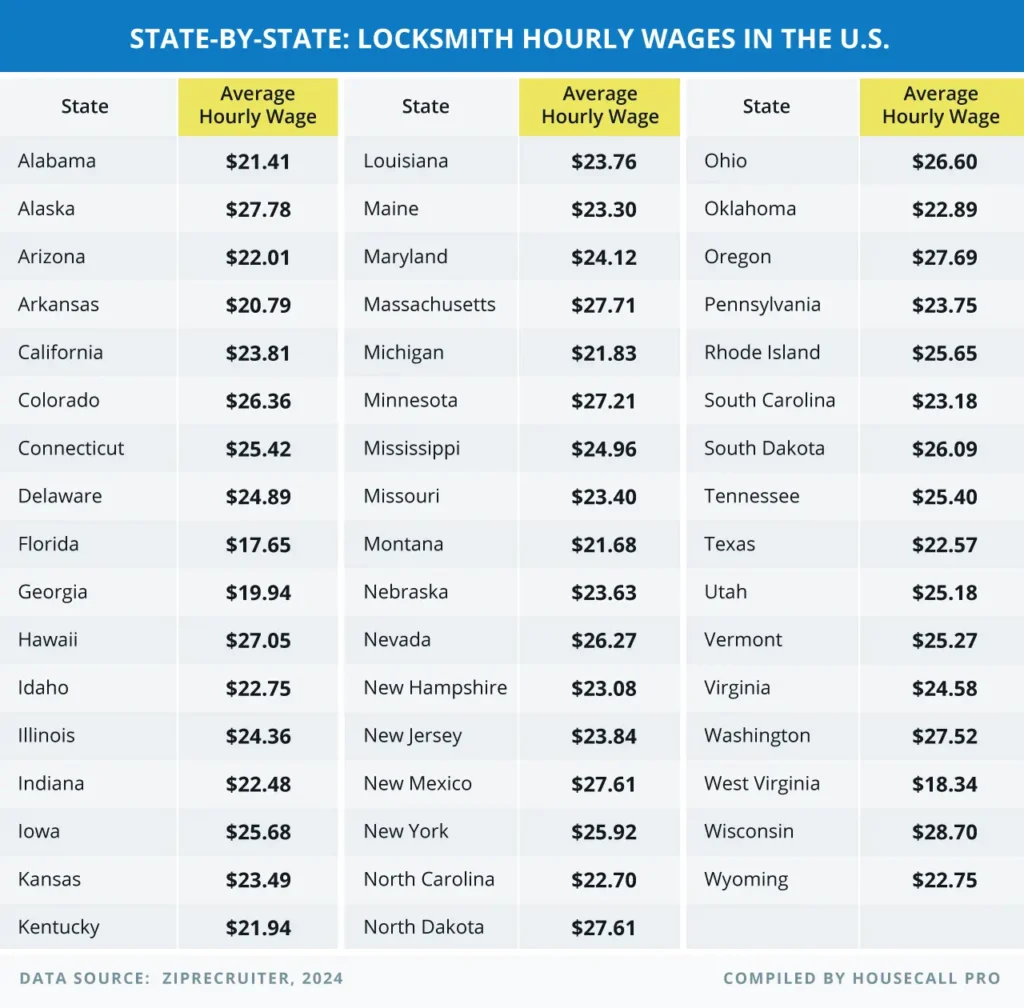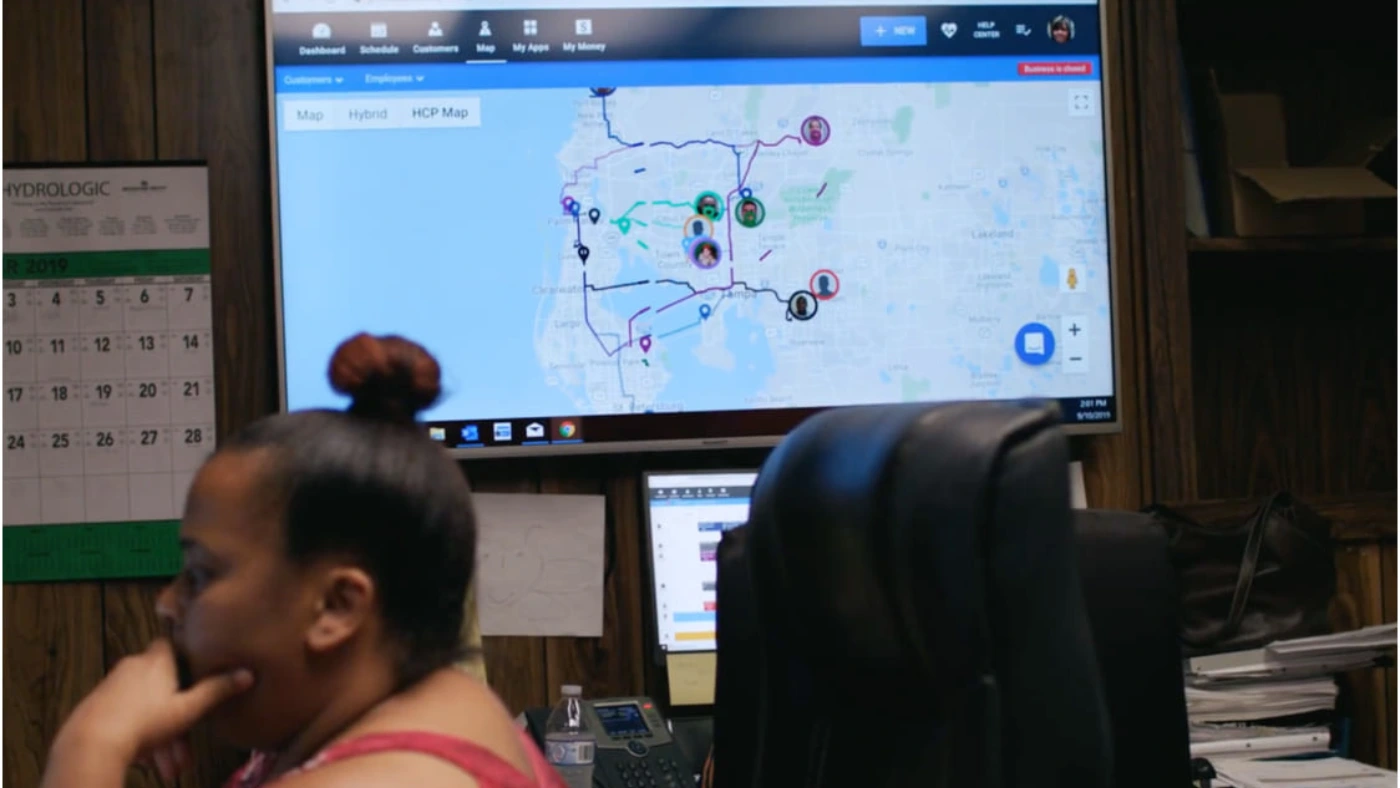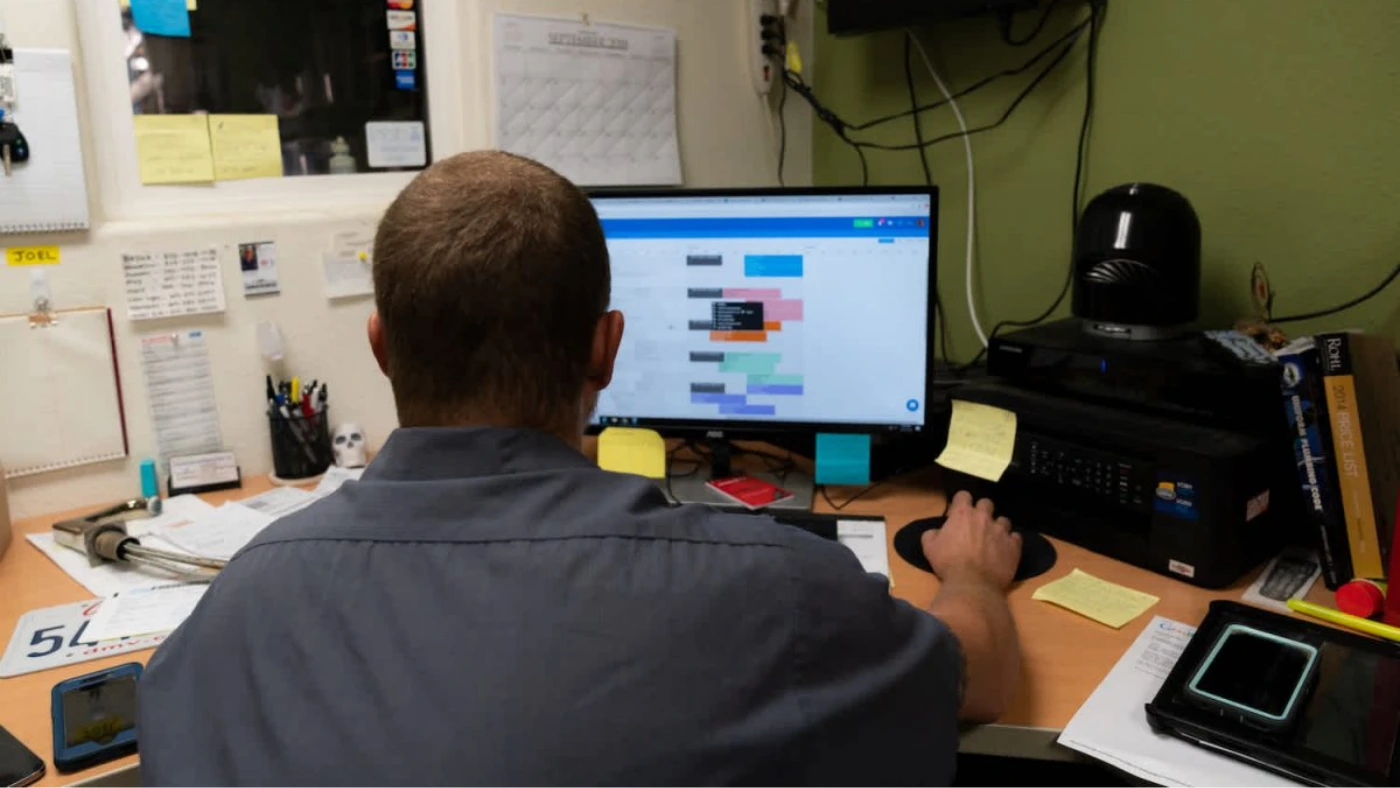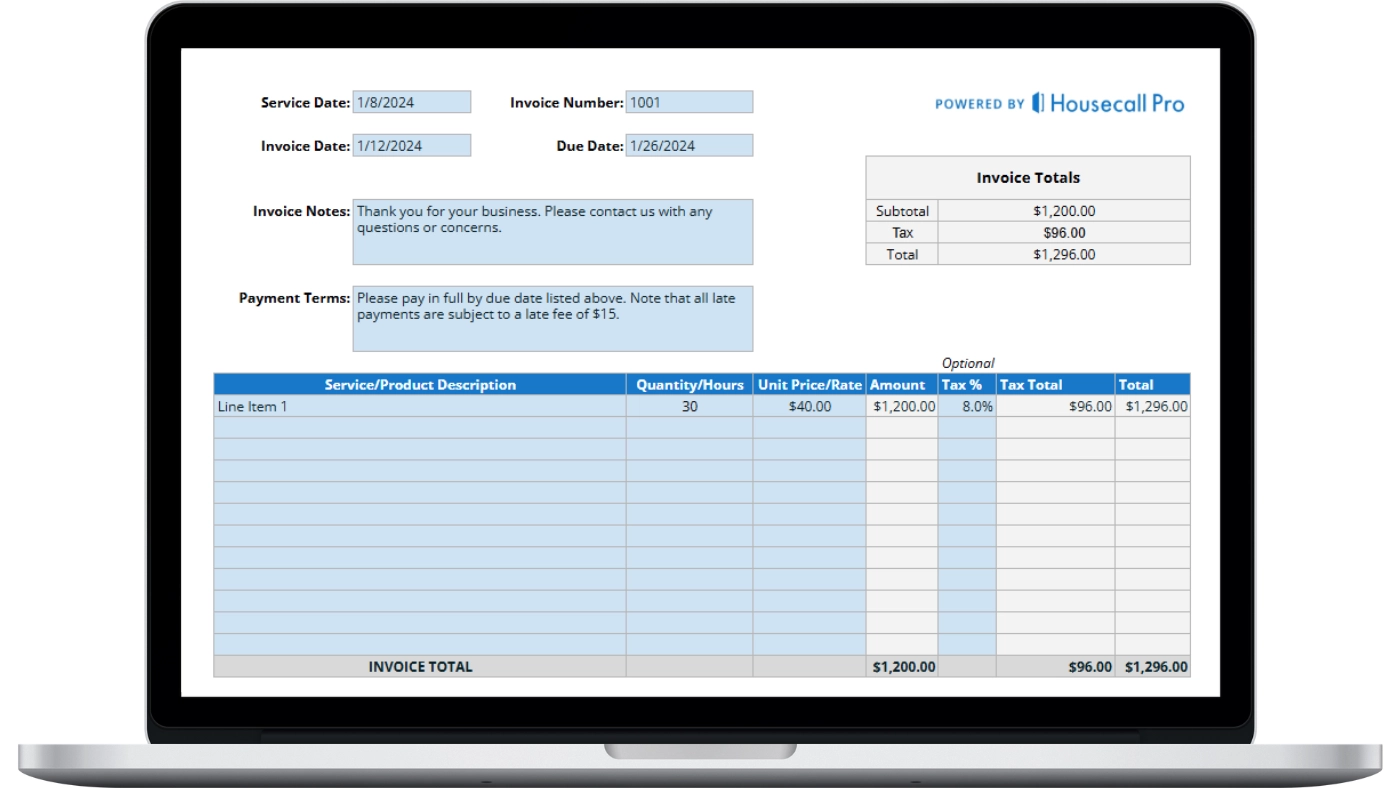Spending too much time on admin work?
Automate your daily tasks and save time with our home service software.
Want to win more jobs with less effort?
Grow your business and send quick quotes with our home service software.

Have you ever wondered what kind of income a locksmith can expect to earn? Truth is that becoming a locksmith can be a surprisingly lucrative career path. From the average hourly rates to the factors that can influence a locksmith’s take-home pay, we’ll leave no lock unopened. Whether you’re considering a career change or simply curious about the financial realities of the locksmithing profession, this post is your key to unlocking the secrets of locksmith salaries.
Here’s How Much You Can Earn as a Locksmith
- Are Locksmiths in Demand?
- Locksmith Job Responsibilities
- Factors That Affect a Locksmith's Salary
- How Much Can You Earn as A Locksmith?
- State-by-State: Locksmith Hourly Wages in the U.S.
- How Much Does a Locksmith Earn Per Year?
- Locksmith Business Owner Salary
- FAQs
- Is becoming a locksmith a good career choice?
- How long do you have to train to be a locksmith?
- Is it profitable to be a locksmith?
Are Locksmiths in Demand?
The locksmith industry fluctuates due to the ever-changing world of technology and security innovations, but this skilled trade is always in demand. As new technology develops, the need for locksmiths grows. Today, newer innovations in door security and locking systems mean a locksmith does more than just fix locks and replace keys.
Businesses want better security, so they need programmable key cards and keyless entry systems that require repairs and replacements over time. On the other hand, locksmith companies must keep up with rising demand using software and systems designed to seamlessly manage all their critical business aspects. From sending quotes, scheduling jobs, invoicing, accepting payments and having solid payroll solutions, self-employed locksmiths have a multitude of locksmith software options to help keep up with demand.
Locksmith Job Responsibilities
Becoming and working as a locksmith is no easy task. These skilled professionals possess a wide variety of expertise, from the troubleshooting of locks to expertly re-keying the latest electronic security systems. With extensive knowledge and special tools, locksmiths can tackle a wide array of lock-related challenges:
- Troubleshooting and repairing malfunctioning locks, whether they’re traditional manual locks or electronic models.
- Rekeying locks to provide new keys and enhance security, ensuring only authorized individuals have access.
- Lock repairs and maintain their integrity and security, ensuring they continue to function reliably.
- Installing and programming advanced electronic locks, including smart home systems and access control devices.
- Utilizing a comprehensive toolkit of specialized tools and equipment to tackle even the most complex lock-related issues.
Factors That Affect a Locksmith’s Salary
1. Location
Since the economy varies from state to state, employee wages/salaries vary depending on your business’s location. Demand and population also play a significant role. According to ZipRecruiter, Wisconsin’s average locksmith salary is $59,704 yearly, while Florida ranks at just $36,712. States like Kentucky and Arizona fall in the middle, averaging around $45,000 per year.
Aside from state salary averages, city salaries can vary significantly. According to the Bureau of Labor Statistics (bls.gov), Ohio’s annual mean wage for locksmiths in Cleveland-Elyria is $46,520, while it is $53,140 in Columbus.
2. Industry
A professional locksmith serving commercial industries earns more than one focused on residential services only. However, automotive locksmiths generally charge higher rates, leading to higher annual salaries.
Skilled locksmiths specializing in commercial properties must now service, install, and upgrade various smart lock entry systems. According to IBISWorld, as of Jan. 2024, there were more than 24,000 locksmith businesses in the United States, with over 34,000 employees and a total revenue of around 2.6 billion.
3. Years of Experience
Long-term, highly experienced locksmiths (10+ years) have solid reputations and connections, often raising their salary level above and beyond semi-experienced (1-10 years) and new/apprentice locksmiths.
Experience plays a significant role in your salary as a locksmith business owner and increases wages as an employee. The more knowledge and experience you have in the locksmith industry, the more money you can earn.
4. Education & Certifications
While you only need a high school diploma to enter the locksmith industry, further educational ventures increase your skills, talents, knowledge, and certifications. Having one or more certifications can make you a trusted locksmith in your area, presenting you with higher income potential.
In today’s technological world, certified locksmiths get more business. Security is becoming more critical every day, so companies want to ensure they’re working with someone they can trust with the experience and certifications needed to get the job done.
How Much Can You Earn As a Locksmith?
If you’ve read this far, you know your earnings as a locksmith depend on many factors. Years of experience, industry selection, education and certifications, and the location contribute to your annual salary.
How Much Money Does a Locksmith Make Per Hour?
The average starting rate for a locksmith is around $14 per hour, based on no real experience. Employee typical earnings range from $18-35 per hour, with a medium around $24 per hour.
Running your own locksmith business can earn as much as $125 per hour when offering emergency call services.
State-by-State: Locksmith Hourly Wages in the U.S.

How Much Does a Locksmith Earn Per Year?
Yearly income as a locksmith is reasonable, ranging from $30,000 to $80,000 annually. Your earnings potential relies on experience, education, certifications, and job history.
Here are the nationwide averages for locksmith earnings based on experience, according to CareerExplorer.
Entry-Level Locksmith Salary
The average starting-level locksmith’s earnings are around $29,000, but this number can vary based on location and demand in the area. Most entry-level positions have completed training, begun learning new skills, and gained experience with various lock types and brands.
Journeyman Locksmith Salary
Journeyman locksmiths have a decent amount of experience, but they continue to learn as time continues. They often handle everyday tasks like rekeying and installing new locks. However, they continue to expand their skills through advanced lock mechanisms and identifying security issues. The average annual salary for a journeyman locksmith is around $29,000.
Master Locksmith Salary
Master locksmiths have been in the industry for years, often ten or more. They’ve worked with many brands of locking systems and have the experience, training, and certifications to handle advanced security systems and lock mechanisms. The average salary for a master locksmith is around $79,000.
The term “master” is just that. It does not necessarily represent the locksmith’s capabilities or guarantee their certification level. It is just a name for well-experienced locksmiths—they are masters of the trade.
With the proper training, they can become Certified Master Locksmiths (CMLs), Certified Master Automotive Locksmiths (CMAL), etc. It is also NOT associated with the Master Locksmith’s Association (MLA) in the UK. In the US, many master locksmiths are members of The Associated Locksmiths of America (ALOA) or similar organizations and obtain certifications from them.
Locksmith Business Owner Salary
According to IBIS World, there were 24,563 locksmith businesses in the US in 2023. CareerBuilder shows a revenue range of $36,000-$120,000. Of course, a new company might fall in the lower range, but those with a few years of operation and a good reputation can reach as high as $120,000 annually.
Average Revenue for Locksmith Companies
As a locksmith business owner, revenue can vary depending on the following factors:
- Location and demand
- Your rates
- Years of experience
- Certifications
- Type of work performed: Consumer/commercial, automotive, access control specialization, safe repairs, etc.
- Operation methods
New locksmith companies must establish processes, purchase equipment, obtain the required licenses, set up bookkeeping systems, and more. These costs keep the revenue lower initially, but as the business grows, so does the revenue.
Operation methods certainly contribute to revenue levels. Many locksmith companies spend too much time dealing with invoices and payments, booking appointments, and keeping clients’ and customers’ records using in-house software. There are better ways, such as locksmith business management software which can help boost revenue by automating customer service, payment management, and job scheduling.
Average Profit Margins for Locksmith Businesses
New locksmith businesses start with low-profit margins, but as time progresses, revenue increases and gradually covers the startup costs. Locksmith business software along with customer financing can help boost profits.
Aside from location, demand, and competition, startup businesses can expect to profit between $50,000 and $80,000 based on a 50% profit margin. That margin increases steadily each year as workflow and demand increase.
Existing locksmith businesses can carry a profit margin ranging from $180,000 to $200,000, depending on many factors. What is their location? Do they have several locksmiths? Do they rent a space or work from home? Do they require several vehicles?
Every locksmith business requires different needs and operations, determining the profit margin’s percentage rate. Using simplified payment software, consumer financing services, integrated online booking, and more can help boost profits to a higher range.
FAQs
Is becoming a locksmith a good career choice?
Becoming a locksmith depends on your personality traits and desires. You must be willing to work hard and pay attention to details. You must be prompt (on time) for work, client/customer appointments, etc. You must have the desire to learn and gain certifications. You must know and understand all the trade regulations, locally and nationally. The list can go on, but this provides a better picture.
Locksmiths are still in demand, so becoming one is a good career choice if you are willing to dedicate time to it. Technology and innovative designs and devices continue to emerge, creating the need and demand for locksmiths capable of handling such technological advances.
Residential service has moved from the primary key and lock security methods to advanced digital entry systems. Vehicles now feature keyless entry, remote-controlled locks, built-in security electronics, etc. Commercial businesses now utilize key-card entry and management systems, advanced door mechanisms, magnetic security, digitally controlled safes, security and surveillance integration that you’d need to work with when providing locksmith services, and much more.
How long do you have to train to be a locksmith?
Training for a locksmith position does take time. The first step is an apprenticeship training program where you watch and help perform locksmith services. Several states (and some local legislations) require at least six months of in-field training and experience before they will issue you a license. Most states don’t require licensing, but local legislation may have requirements to fulfill before issuing one.
Many locksmith companies require in-house training for recruits, which can take anywhere from 3 months to 12 months. They want to ensure you are on track with their methods, rules, regulations, and procedures. Once you can handle jobs and business actions yourself, you become a locksmith while exiting the apprenticeship.
Is it profitable to be a locksmith?
Yes. Locksmiths earn a decent salary, but it depends on your experience level, the licensing and certifications you hold, and your work location. Salaries often rise over time, but you can expect to make $25,000 to $80,000 annually as an employee.






